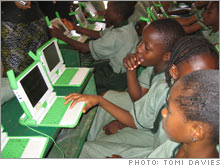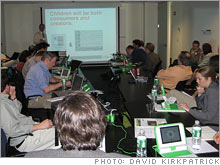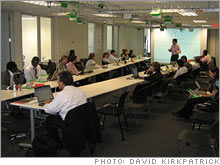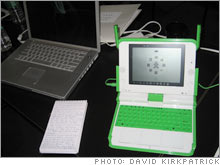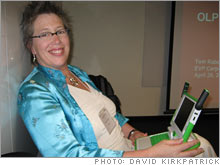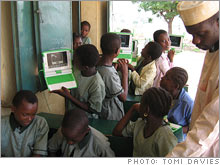Does Intel fear $100 laptops?The superhot '$100 laptop,' which costs $176, is at the heart of a feverish dance for influence by PC giants Intel and Microsoft. It may be coming to the United States, says Fortune's David Kirkpatrick.NEW YORK (Fortune) -- Nicholas Negroponte, founder and chairman of the One Laptop Per Child (OLPC) non-profit group, on Thursday revealed big news about his laptop for the poor children of the world. His biggest revelations at a Cambridge press and analyst briefing: The laptop will run Windows, and the group is seriously considering selling it in the United States. The briefing also underscored that this is likely to be one cool computer. The machine, which OLPC aims ultimately to price at $100, is called the XO. (Previous articles I've written on it in Fortune are here and here.)
In a side conversation, Negroponte had a surprising explanation for his new focus on the United States. While demand here has been strong - governors of 19 states have expressed interest for students in their states, and even Governor Jeb Bush of Florida has visited OLPC in Cambridge twice - the project has up to now aimed primarily at giving computer power and net access to children in developing countries. But now Intel's longtime animosity to the project has taken on new intensity, and that has consequences. Negroponte asserts that in the last couple of weeks, as the final deadline of May 30 approaches for countries to make firm commitments for XOs (ideally in lots of a million at a time), Intel (Charts, Fortune 500) has been methodically going to the expected launch countries and offering unusually attractive terms for its own much-less-sexy Classmate PC. The Classmate is essentially a standard but simplified desktop that like the XO is decorated in green plastic, but less fetchingly. Negroponte claims Intel is pricing it at $180, significantly below its cost of production, and for lots of only 10,000. In an e-mail, Intel spokesman Bill Calder responds that the Classmate's price is generally higher and he's not sure what Negroponte is referring to. But if Negroponte is right, the price is telling, because at present the XO will cost countries about the same amount - $176 to be exact says Negroponte. (The $100 price is OLPC's target once it is making these things in the tens of millions, which he ambitiously believes is possible by the end of 2008.) Intel's Calder confirms that it has recently done a "big deal" with Pakistan, one of OLPC's seven "launch" countries, which also include Argentina, Brazil, Libya, Nigeria, Thailand and Uruguay. But Calder adds: "The notion that we were somehow going to 'his' likely launch countries caused some perplexed looks, if not outright laughter here. We've been in these markets since like, forever." But there's no question that Intel hates the XO, primarily, it seems, because it is powered by a low-end microprocessor from AMD (Charts, Fortune 500). Negroponte says "we can't compete" with an offer like Intel's, although OLPC hasn't lost any countries yet. OLPC aims for huge purchase agreements lest its marketing costs skyrocket and with that the price of the XO. "We need to trigger a supply chain for three million units to get started," Negroponte says, "and need a few large agreements to kick it off. I just cannot do 300 deals of 10,000 each." But he has a response: "What can we do that Intel can't? And the answer is - launch in this country." Intel couldn't sell the Classmate here, Negroponte reasons, for fear of alienating its customers like Dell (Charts, Fortune 500) and Hewlett-Packard (Charts, Fortune 500), who do the marketing in the classic PC industry ecosystem. Selling in the United States could help get volumes up and thus costs and prices down, as well as strengthen support for the XO and attract more programmers to it, he says. OLPC eschews profit on the XO. As for putting Windows on the XO, something Negroponte spoke about as a fait accompli at the briefing, that comes as news - albeit happy news - to Microsoft (Charts, Fortune 500). "We will run Windows," Negroponte said. "Windows will work on it." Yet just last week Will Poole, senior vice-president of Microsoft's Market Expansion Group, complained to me that he was still being rebuffed by Negroponte. Microsoft has five or so XOs working in its research labs, and, according to Poole, has sought repeatedly to interest Negroponte in using Windows. But OLPC's position has been that while it wants Windows, it would only take it if it were open-sourced. That, Poole says firmly and unsurprisingly, Microsoft would never do. But Thursday when I asked Negroponte point blank if he still insisted on open-sourcing Windows as a condition for it running on the XO, he answered clearly: "No." The reason appears to be that as the date approaches for firm commitments of big bucks, many interested countries are simply unwilling to risk hundreds of millions of dollars on an unproven machine. "There's enough interest from the countries for us to make sure it boots both," Negroponte says. As Microsoft's Poole points out, no government leader wants to be known as the one who bought their country's kids a million underpowered laptops that don't run decent software. Last week, I was with Poole in China when he and colleagues announced a groundbreaking program to sell a version of Windows XP, along with much of Office and additional educational programs for the total price of $3, when governments buy for students. That now makes it eminently practical to put Microsoft software on the XO. Poole did tell me with some satisfaction that Negroponte had recently taken his advice and added an SD slot to the XO so that Windows and Office could be inserted into the machine. Also, recently OLPC decided to significantly upgrade to a more-powerful AMD processor and a larger memory. That will make it much easier to run Windows. In another room at OLPC headquarters Thursday, representatives from numerous countries were getting briefed on the machine. Recent visitors have come from 25 countries, says Negroponte, like Peru, for instance, which hasn't up to now been a top target. I saw people from Kenya and Russia as well. And I ran into Tomi Davies, whose Alteq consulting firm in Lagos, Nigeria is assisting with implementation of the pilot project in that country, where 200 kids now own their own XOs. I asked him whether he thought the OLPC project would work. "It is working!" he said with vigor, bringing up on his laptop photos of the engaged kids in Abuja state who have had their own XOs since February. He, like many I've spoken with from developing countries, is enormously excited by this effort, and seems committed to its success. Talking to him and looking at his pictures makes me realize yet again just how deep is the craving for technology to enable people to engage with the modern world. Whatever happens to the XO, it is clearly catalyzing a major global movement to try to get technology into the hands of the world's schoolchildren. Microsoft's Poole says that "Nick is doing a good job raising awareness that one can improve education through the application of appropriate technology. He's been tireless in bringing that to the forefront of the world's attention." OLPC has, against all odds, come up with a spectacularly appealing machine that has real promise to truly change the world. As for Intel, it should really have better things to do than to combat a non-profit effort that seems to be making a difference. |
Sponsors
| |||||||||||||||||||||||||


